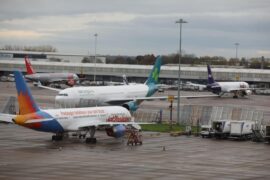
Travel links between the China and the North-west have been restored to pre-pandemic levels with Hainan Airlines resuming four-times weekly flights between Manchester Airport and Beijing.
The Chinese airline began flying direct from Manchester to Beijing in 2016, delivering a significant economic and cultural boost to the region by offering the first direct route from the Northern Hub to Mainland China. Covid-related travel restrictions in both the UK and China meant the service was paused in 2020, until a single weekly flight resumed in August 2022.
Following the restoration of direct flights last autumn, the service has proved so popular that Hainan Airlines has now increased the service to four times a week from April. Flights will operate from Manchester to Beijing every Tuesday, Thursday, Saturday, and Sunday, all by the Airbus A330 aircraft.
Manchester Airport Managing Director Chris Woodroofe said:
“The economic benefits of more regular flights between Manchester and Beijing will be significant, whether that be in terms of trade, tourism or inward investment.
“But the positive impacts go beyond that; Manchester’s Chinese community is part of the fabric of the city, and this increase in frequency will make it much easier for people to travel in both directions to visit friends and family.
“As the final international travel restrictions have been removed, it has been hugely exciting to see services like this return to full strength, underlining Manchester Airport’s role as the UK’s global gateway in the North.
“I look forward to working with Hainan Airlines to make this service as successful as possible.”
Manchester is home to one of the country’s biggest and most well-established Chinese communities. Manchester’s Chinatown was first established more than 100 years ago and the city’s first Chinese restaurant – the Ping Hong in Mosley Street – opened in 1948.
According to the 2011 Census more than 13,500 Chinese residents live in Manchester, more than any city in the UK outside London, with large Chinese communities also in other cities in Manchester Airport’s catchment, including 8,000 Chinese residents in Liverpool, 7,000 in Sheffield and 6,000 in Leeds.
The restoration of pre-pandemic service levels has been welcomed by business and civic leaders in the North-west.
Rhys Whalley, Chief Executive of the Manchester China Forum said:
“We’re delighted to see Hainan Airlines confirming its plans to return to pre-pandemic frequencies with 4 flights per week between Manchester and Beijing. With COVID restrictions only having been lifted two months ago, this signals a remarkable recovery to a critically important long-haul route connecting the North of England into the capital of the world’s key growth economy.
“In its first two years of operation, the Manchester-Beijing route stimulated a 40% increase in export values as well as visitor numbers to the region. With International Monetary Fund estimates suggesting that China will represent a third of global growth in 2023 and its outbound tourism market expected to exceed US$163 billion by 2024, direct links will undoubtedly underpin the region’s ambitions to stimulate growth through enhanced connectivity with this key global consumer market.”
Henri Murison, Chief Executive of the Northern Powerhouse Partnership, said:
“This is great news not just for Manchester but the whole of the North of England. Manchester Airport acts as the North’s long-haul hub, giving us access to key global markets such as China which are absolutely vital for our economy, unlocking billions through trade, tourism and investment.
“It’s also critical for supporting the thousands of international students, who come to the Northern Powerhouse to study at our world-leading universities.
“Export values grew 41% to £1.29bn in the two years after the route first launched in 2016, while enquiries from China about investment in the Greater Manchester area doubled.
“Our own analysis found that inward investment into the North from Asia has grown significantly in recent years and now that regular flights have resumed, we hope this upward trend can continue.”




















 MAG airports continued to welcome record-breaking numbers of passengers in April
MAG airports continued to welcome record-breaking numbers of passengers in April  Consultation launched to hear views on Cheshire East bus services
Consultation launched to hear views on Cheshire East bus services  Work completes on final section 11 km Macclesfield to Greater Manchester cycle route
Work completes on final section 11 km Macclesfield to Greater Manchester cycle route